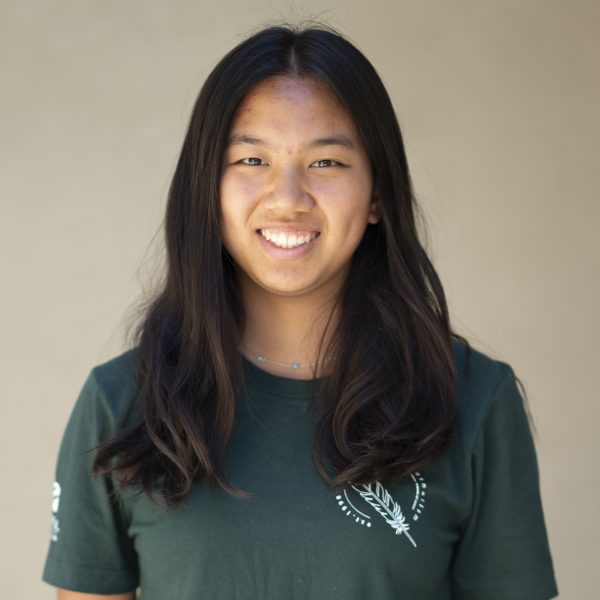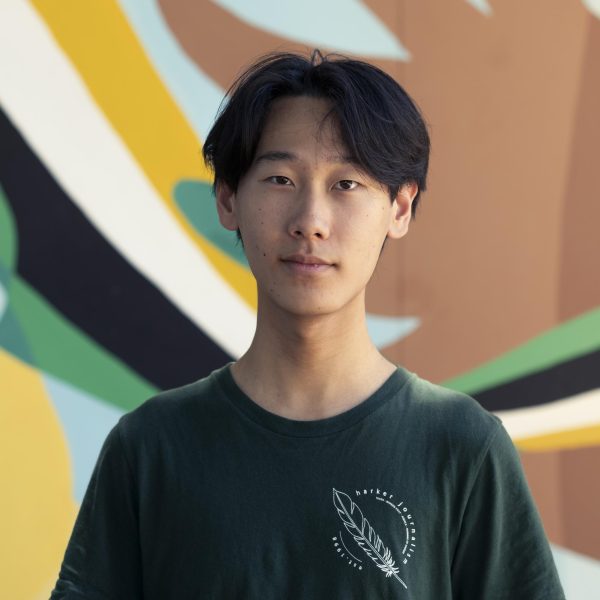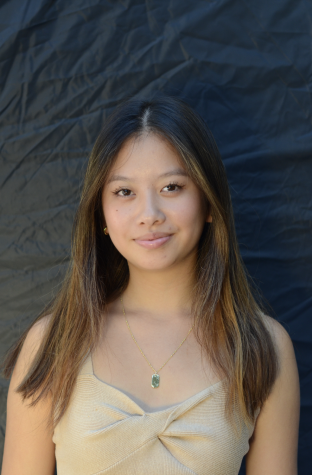Blooming from the STEM: Linguistics leader
Rishab Parthasarathy (‘22) explores patterns across cultures through language
Harker alum Rishab Parthasarathy (‘22), along with seven other students, represented the United States at the 19th annual International Linguistics Olympiad (IOL) from July 25 to 29, 2022, on the Isle of Man. “Every day is a new experience: meeting new people and being exposed to a really new culture,” Parthasarathy said. “I never knew that the Isle of Man had such a specific and vibrant culture, including multiple dialects of the same language within 20 miles of each other. It was really cool to be exposed to a culture that I hadn’t learned about before [and] see people who think about language.”
How do you conjugate the verb “to give” in Ubykh, a Circassian language that died 30 years ago with the passing of its last native speaker? How do you translate from English to N|uuki, a South African language with just one remaining speaker, and back again? How do you match 22 family members to their position on a family tree, given their relationships written in Arabana, a South Australian language spoken by less than 20 people today?
Harker alum Rishab Parthasarathy (‘22) did all that. Tucked in between England and Ireland, the Isle of Man welcomed 184 contestants from 50 teams across 36 countries for the 19th annual International Linguistics Olympiad (IOL) from July 25 to 29, where competitors pondered and debated problems concerning languages from Ubykh to Arabana. Parthasarathy, along with seven other students, represented the United States at the competition.
Parthasarathy received a silver medal at the IOL, and the U.S. brought home the IOL Team Trophy with the highest average individual score and a bronze medal in the team contest.
The selection process to join the U.S. IOL team begins with the North American Computational Linguistics Open Competition (NACLO), an exam featuring diverse linguistics puzzles. Top scorers of the contest then compete in the invitational round, of which the top eight U.S. students are chosen to represent the country at the international level.
Parthasarathy first learned about NACLO in his sophomore year. After years of participating in math and science competitions through middle and high school, he decided on a whim to sign up for the competition, attracted to the idea of playing with languages and solving puzzles. Looking back, Parthasarathy believes that the puzzle aspect of the exam serves as a fun and friendly introduction to linguistics.
“I was also trying not to just stagnate as a person,” Parthasarathy said. “That’s how I’ve always done things: if something is fun to me, I’ll do it. Learning science and solving puzzles has always been fun, so you put it together and get a perfect storm.”
Preparing for the competitions involved training his intuition through studying past years’ problems, which span topics from number systems to morphology. Despite the hours of practice under his belt, Parthasarathy had one goal entering NACLO: to enjoy the test as much as he could.
“Once I started applying that mindset of not [putting] pressure on yourself and accepting that you’re going to do the best you can, in general, I started doing better on things,” Parthasarathy said.
Ultimately, taking the contest with an open mind led to Parthasarathy’s success. After being invited to join the U.S. IOL team, Parthasarathy and his teammates began to practice further individually and as a team, growing closer to each other and developing contest strategies.
“We had some training sessions over zoom, where the team coaches would talk about some aspect of linguistics,” IOL teammate Luke Robitaille said. “Teamwork is definitely important because for the team round, you work together for four hours and try to make as much progress as you can on some really long complicated problem. [Parthasarathy is] good at being a supportive teammate and, for the team, was working very effectively.”
During the competition, the sheer diversity in language of the Isle of Man despite its small size surprised Parthasarathy. From learning about the cultures of his fellow competitors to performing songs in different countries’ national languages, Parthasarathy enjoyed the unique experiences he encountered during his stay.
“Every day is a new experience: meeting new people and being exposed to a really new culture,” Parthasarathy said. “I never knew that the Isle of Man had such a specific and vibrant culture, including multiple dialects of the same language within 20 miles of each other. It was really cool to be exposed to a culture that I hadn’t learned about before [and] see people who think about language.”
Unlike math and science olympiads, linguistics olympiads offer a unique view into the field; solving these language puzzles closely resembles the real work and research of linguists.
“A lot of [linguistics olympiads] is seeing these patterns and learning how to identify patterns,” Parthasarathy said. “That’s applicable beyond just linguistics, but it’s cool to see a competition where they’re actually teaching you what a linguist will be doing in the field which is exactly trying to recreate languages from scratch with this very limited range of information.”
Such problems explore various languages and their changes. For one, several Polynesian languages evolved over time and witnessed shifts in the languages’ vowel sounds. With their roots nearly 8,000 miles away, languages from the Siberian mountains saw analogous changes. Surprising patterns across languages like these intrigued Parthasarathy as he discovered the beauty of language throughout his linguistics career.
“At the beginning, [I was interested in] the puzzle aspects [of linguistics], but by the end, I came out interested in language,” Parthasarathy said. “It’s a puzzle. It’s fun. Linguistics olympiads specifically bring you in with the puzzles, and once you really get to that, once you keep doing it, they keep teaching you more and more.”
In learning languages, Parthasarathy did not stop at competitions. Most people would not consider DNA or even barcodes to be language, but these underlying connections fascinated him; in his scientific research, he applied techniques in natural language processing to analyze genomics.
Now, as an alum of NACLO and IOL, Parthasarathy contributes original problems to the competitions, a process he finds fulfilling.
“It’s a very tight knit group, all alumni giving back to the organization and helping to coach, helping to bring the team together,” Parthasarathy said. “Can I help provide the same boost to someone else? How do you write problems like that? How do you make sure the competition stays running? You’ve seen these people coaching you, now you’re working with them and can actually learn how they think about this. It’s an incredible opportunity.”
To younger students, Parthasarathy recommends exploring linguistics, not only because of the richness of his own experience but also because of the broader community he found.
“If people are coming into high school and they don’t know what they’re interested in or they’re still exploring this, try out language and linguistics, try NACLO,” Parthasarathy said. “If you don’t like it, that’s completely fine, but if you end up enjoying it, keep trying it out because it is really cool and fun when it comes down to it.”

Olivia Xu (12) is the co-editor-in-chief of Humans of Harker, and this is her fourth year on staff. She is excited to celebrate the Class of 2024 and collaborate...

Steven Jiang (12) is a Conservatory editor for the TALON Yearbook, and this is his fourth year on staff. This year, he looks forward to enjoying more Conservatory...

Sabrina Zhu (12) is the co-editor-in-chief of the Winged Post, and this is her fourth year on staff. Sabrina hopes to capture more campus life through...


















![“[Building nerf blasters] became this outlet of creativity for me that hasn't been matched by anything else. The process [of] making a build complete to your desire is such a painstakingly difficult process, but I've had to learn from [the skills needed from] soldering to proper painting. There's so many different options for everything, if you think about it, it exists. The best part is [that] if it doesn't exist, you can build it yourself," Ishaan Parate said.](https://harkeraquila.com/wp-content/uploads/2022/08/DSC_8149-900x604.jpg)




![“When I came into high school, I was ready to be a follower. But DECA was a game changer for me. It helped me overcome my fear of public speaking, and it's played such a major role in who I've become today. To be able to successfully lead a chapter of 150 students, an officer team and be one of the upperclassmen I once really admired is something I'm [really] proud of,” Anvitha Tummala ('21) said.](https://harkeraquila.com/wp-content/uploads/2021/07/Screen-Shot-2021-07-25-at-9.50.05-AM-900x594.png)







![“I think getting up in the morning and having a sense of purpose [is exciting]. I think without a certain amount of drive, life is kind of obsolete and mundane, and I think having that every single day is what makes each day unique and kind of makes life exciting,” Neymika Jain (12) said.](https://harkeraquila.com/wp-content/uploads/2017/06/Screen-Shot-2017-06-03-at-4.54.16-PM.png)








![“My slogan is ‘slow feet, don’t eat, and I’m hungry.’ You need to run fast to get where you are–you aren't going to get those championships if you aren't fast,” Angel Cervantes (12) said. “I want to do well in school on my tests and in track and win championships for my team. I live by that, [and] I can do that anywhere: in the classroom or on the field.”](https://harkeraquila.com/wp-content/uploads/2018/06/DSC5146-900x601.jpg)
![“[Volleyball has] taught me how to fall correctly, and another thing it taught is that you don’t have to be the best at something to be good at it. If you just hit the ball in a smart way, then it still scores points and you’re good at it. You could be a background player and still make a much bigger impact on the team than you would think,” Anya Gert (’20) said.](https://harkeraquila.com/wp-content/uploads/2020/06/AnnaGert_JinTuan_HoHPhotoEdited-600x900.jpeg)

![“I'm not nearly there yet, but [my confidence has] definitely been getting better since I was pretty shy and timid coming into Harker my freshman year. I know that there's a lot of people that are really confident in what they do, and I really admire them. Everyone's so driven and that has really pushed me to kind of try to find my own place in high school and be more confident,” Alyssa Huang (’20) said.](https://harkeraquila.com/wp-content/uploads/2020/06/AlyssaHuang_EmilyChen_HoHPhoto-900x749.jpeg)



![Harker alum Rishab Parthasarathy (‘22), along with seven other students, represented the United States at the 19th annual International Linguistics Olympiad (IOL) from July 25 to 29, 2022, on the Isle of Man. “Every day is a new experience: meeting new people and being exposed to a really new culture,” Parthasarathy said. “I never knew that the Isle of Man had such a specific and vibrant culture, including multiple dialects of the same language within 20 miles of each other. It was really cool to be exposed to a culture that I hadn’t learned about before [and] see people who think about language.”](https://harkeraquila.com/wp-content/uploads/2023/03/RishabHoHPhoto-900x598.jpeg)